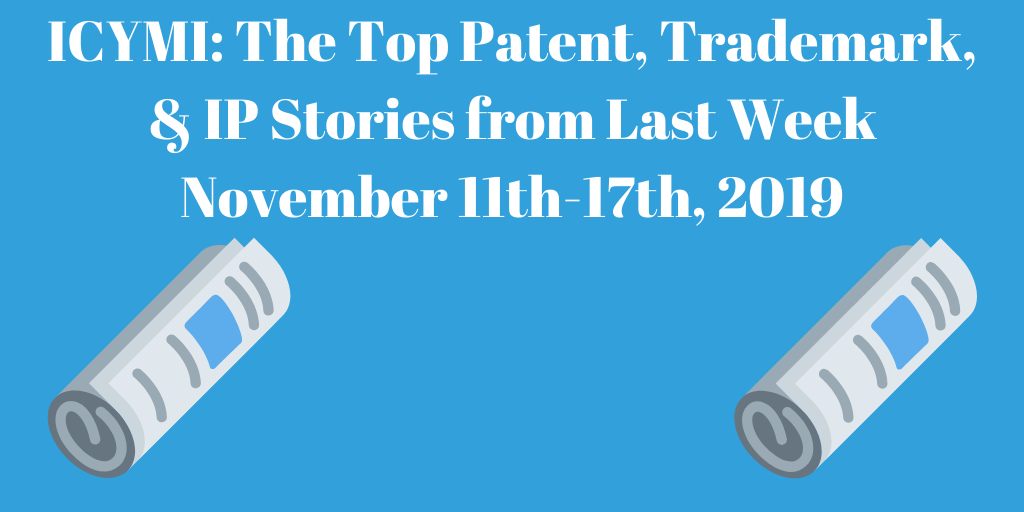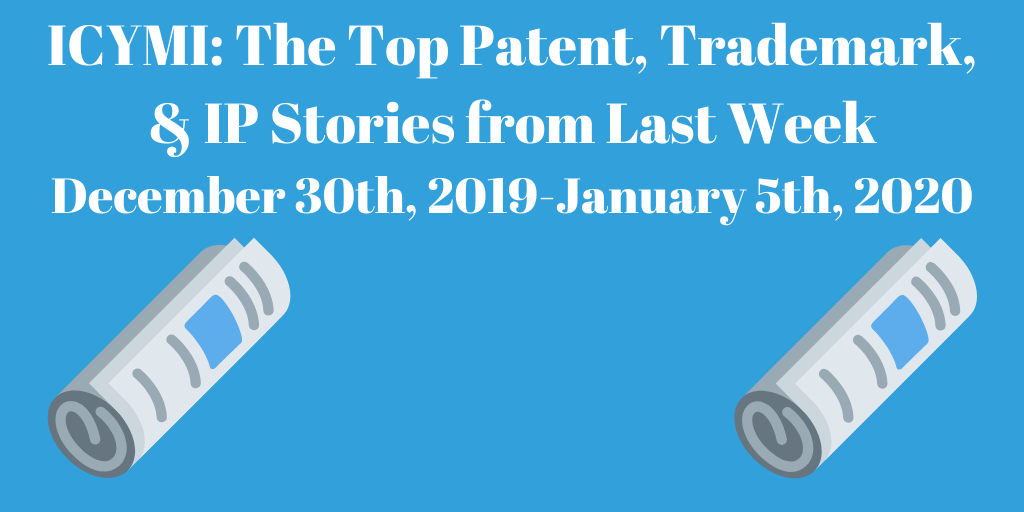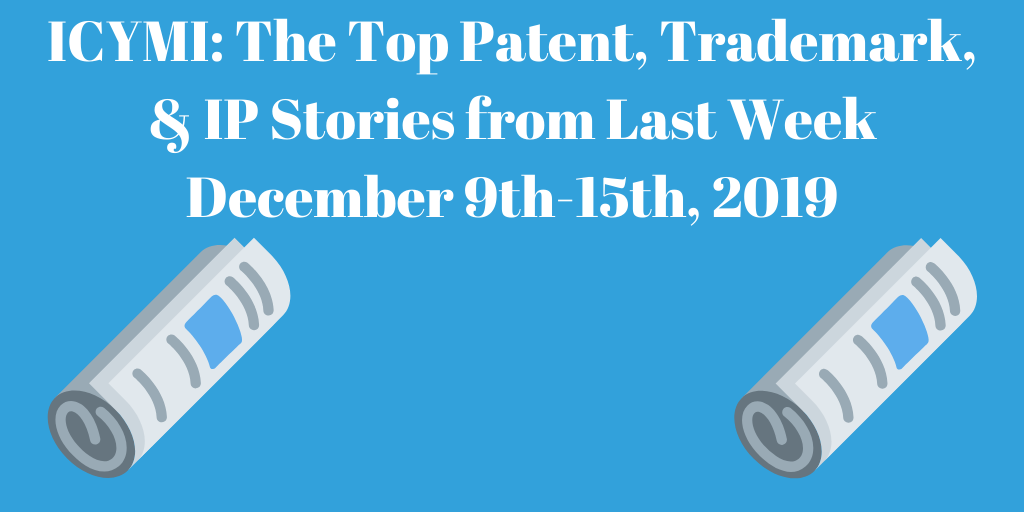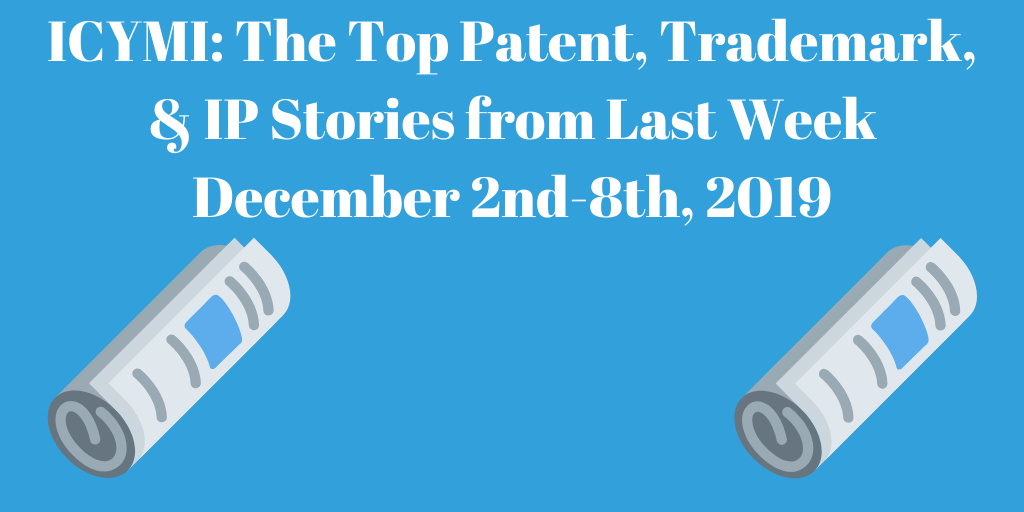Top Patent, Trademark, and IP Stories from Last Week (11/11-11/17/19)
Every week, we will be highlighting the top patent, copyright, trademark, intellectual property, etc. stories of the previous week in our “In Case You Missed It” segment. The list itself is in no particular order and includes a wide range of stories from the patent world that are informative, noteworthy, or just plain bizarre. The stories included encompass everything from Supreme Court cases to insights into growing industries. Please feel free to comment your thoughts on the stories or share an important one we missed!
“Key Republican Senator Points to Chinese IP Theft as Holding up Trade Deal”
Last month, the Trump administration announced it had reached a preliminary “phase one” trade deal with China following more than a year of economic hostility between the nations. President Trump had alluded to the end of Chinese IP theft and forced technology transfers however in the weeks that have followed, a deal has yet to be signed. Chair of the Senate Foreign Relations Committee Sen. Jim Risch has stated talks have stalled since because of the intellectual property issue.
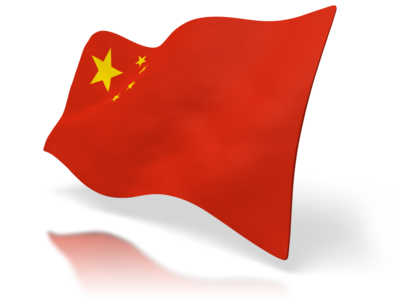
The senator stated at an event that China must “embrace international [intellectual property] norms” and not continue their habitual theft of IP. The senator went on to say that modern business “relies on technology” and “IP is extremely important.” Since this story last week, fears that a deal will not be reached have grown. To read more about this story, click here (via The Hill, November 12th, 2019).
“Supreme Court to Hear Google and Oracle Copyright Case”
On Friday, The U.S. Supreme Court agreed to hear Google v. Oracle America in what some have dubbed the “Lawsuit of the Decade” due to its implications on copyright law. The suit began in 2010 when Oracle sued Google in district court for copyright infringement. Earlier that year, Oracle acquired Sun Microsystems, owner of the Java SE program. Oracle accused Google of copying more than 11,000 lines of Java code and API’s into its Android OS. Google had previously negotiated with Sun Microsystems in 2005 to use the language in their Android OS, but failed. Google has continued to argue the use was “fair use.”
In 2012, a federal judge ruled in Google’s favor stating “so long as the specific code used to implement a method is different, anyone is free under the Copyright Act to write his or her own code to carry out exactly the same function or specification of any methods used in the Java API.” In 2014, a U.S. appeals court ruled in Oracle’s favor stating a “set of commands to instruct a computer to carry out desired operations may contain expression that is eligible for copyright protection.” In 2016, a new trial was heard with the court ruling in Google’s favor. In 2018, a U.S. appeals court overturned the verdict. A writ of certiorari was filed in January 2019.
The questions presented in the certiorari include “whether copyright protection extends to a software interface” and “whether, as the jury found, petitioner’s use of a software interface in the context of creating a new computer program constitutes fair use.” Solicitor General Noel Francisco weighed in on the case stating that Google’s “unauthorized copying” had “harmed the market for [Oracle’s] Java platform.” Google stands by its fair use. Whatever the outcome, the ruling will have huge implications on copyright law in the digital age. To read more about this story, click here (via New York Times, November 15th, 2019).
“Chinese Cyber Threat Now Represents a Major Threat to National Security, Say US Officials”
National security officials have been noticing a growing cybersecurity threat from China. Chinese hackers have been stealing intellectual property from American businesses and using it for their own economic pursuits. The threat is so massive, officials have even claimed it to be a bigger threat than domestic terrorism. The problem extends further than cyberspace however. China has been recruiting college graduates and researchers to share their talents, data, and trade secrets with the state.
FBI Director Christopher Wray has indicated that the theft of intellectual property is “societal” in China and does not see an end to the practice even with a trade deal or blacklisting of companies. Universities and businesses must make cybersecurity and the protection of intellectual property a top priority. Otherwise, Chinese businesses who have stolen IP can take over markets and industries. This would make IP protection negotiations futile at that point. To read more about this story, click here (via CPO Magazine, November 15th, 2019).
Interesting Recent Trademark Filings:
- New York Giants quarterback Daniel Jones has applied to trademark his nickname “DANNY DIMES” (Source)
- The San Francisco 49ers have applied to trademark “NINER GANG” (Source)
- Tesla has filed to trademark “CYBERTRUCK,” “CYBRTRK,” and Cybrtrk logo (Source)
- Singer Justin Bieber filed to trademark “R&BIEBER” (Source)
- “BEAST MODE SOCCER” application fails after conflict with NFL running back Marshawn Lynch’s “BEAST MODE” trademark (Source)
- The WWE filed to trademark “WWE SGL” and “SUPERSTAR GAMING LEAGUE,” hinting at the creation of a possible e-sports league (Source)

